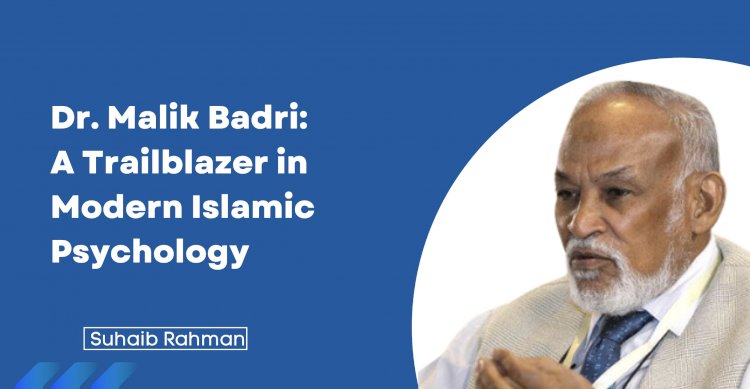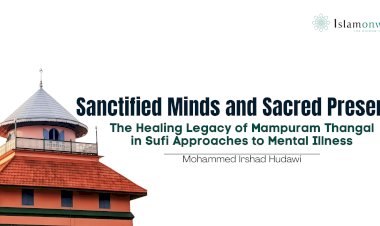Dr. Malik Badri: A Trailblazer in Modern Islamic Psychology
Dr. Malik Badri, often referred to as the "father of modern Islamic psychology," has been a pioneering figure in the integration of Islamic principles into the practice of psychology. His groundbreaking work has established a framework that harmonizes religious depth with scientific rigor, inspiring countless students and practitioners in the field. This article delves into the life and academic journey of Dr. Badri, highlighting his significant contributions to Islamic psychology and the lasting impact of his work on the discipline.
Early Life and Education
Dr. Malik Badri, born on February 14, 1932, in Rufaa, Sudan, came from a family with a strong commitment to learning. His father, Sheikh Babiker Badri, not only founded Ahfad University but was also a prominent advocate for women's education in Sudan. Growing up in this intellectually stimulating environment, Dr. Badri was instilled with a passion for analysis and critical thinking from an early age. His father's progressive beliefs, especially regarding women's rights, profoundly shaped Dr. Badri's perspective and motivated him to advocate for similar causes throughout his life.
Dr. Badri completed his undergraduate studies in Psychology at the American University of Beirut in 1956. This experience was transformative for him, as he was exposed to different psychological theories and started to observe the differences between Western psychology and Islamic psychology. This realization motivated him to delve deeper into psychology from an Islamic perspective.
After obtaining his bachelor's degree, Dr. Badri pursued further education at the University of Leicester in the United Kingdom. There, he successfully completed both his Master's degree and PhD, finishing the latter in 1961. His doctoral research concentrated on cognitive processes, particularly learning and perception. This research allowed him to develop essential skills that enhanced his ability to engage with current psychological theories in a nuanced way. In 1967, Dr. Badri augmented his expertise by obtaining a specialization certificate in Clinical Psychology from Middlesex Hospital. This certificate served as the basis for his subsequent expansion in both academic and practical aspects of the field.
Academic Career and Contributions
Dr. Malik Badri's impressive academic career was marked by his tireless commitment to advancing psychology through the integration of Islamic values. He held positions at various esteemed institutions, including the American University of Beirut from 1962 to 1964. It was during this time that he first started cultivating his groundbreaking ideas on incorporating Islamic principles into psychological practice.
In 1965, Dr. Badri became the Head of the Psychology Department at the University of Jordan. During his time there, he conducted significant research on the intersection between psychology and Islam, which influenced his vision of Islamic psychology. After a short period in Sudan in 1967, he returned to academia as an Associate Professor in the Department of Psychology and Education at Omdurman Islamic University. During his tenure there, he played a crucial role in establishing the university's psychological counseling unit - the first of its kind - which aimed to provide mental health services grounded in Islamic values. Through his leadership in this initiative, he demonstrated his dedication to promoting culturally relevant mental health care in Muslim communities.
Dr. Badri's influence reached far beyond Sudan, as he was appointed as a Distinguished Professor at the International Islamic University in Malaysia. During his time there, he held the prestigious Ibn Khaldun Chair, which enabled him to carry on his important work of connecting modern psychology with Islamic teachings. These accomplishments solidified his status as a respected and influential figure in the field.
In 2017, Dr. Badri founded the International Association of Islamic Psychology (IAIP). This organization is dedicated to promoting the integration of Islamic principles within psychological practice and research. Since its establishment, it has become a vital platform for scholars and practitioners worldwide. They come together to exchange ideas, develop culturally informed psychological frameworks, and create solutions that respect both Islamic teachings and contemporary psychological practices.
The Dilemma of Muslim Psychologists
Dr. Malik Badri's 1979 publication, The Dilemma of Muslim Psychologists, is widely recognized as one of his most prominent works. In this influential book, Dr. Badri offers a compelling critique of the unquestioning adoption of Western psychological theories in Arab countries and the Middle East at large. He challenges the prevailing belief that incorporating secular Western psychology would lead to progress in the region. Instead, Dr. Badri argues that this approach actually worsens the identity crisis experienced by Muslims, as it overlooks the vital spiritual and cultural elements that form an integral part of their worldview.
The Dilemma of Muslim Psychologists sparked an important conversation about the importance of integrating religious and cultural aspects into psychological research. Dr. Badri strongly advocated for a psychology that recognizes the spiritual needs of individuals, which led to the development of a new discipline known as Islamic psychology. This field of study focuses on building mental health frameworks that respect Islamic values and cultural specificity, thanks to the foundation Dr. Badri established. As a result, Islamic psychology has flourished.
Integration of Islamic Principles
Dr. Malik Badri firmly believed in the integration of Islamic principles into the field of psychology. His view was that psychology should not only focus on the mind and behavior but should also consider the spiritual aspects of human existence. His works, such as "Contemplation: An Islamic Psychospiritual Study" and "Sustenance of the Soul," emphasized the importance of a holistic approach to mental health, encompassing emotional, spiritual, and social well-being. Dr. Badri's perspective has played a crucial role in the development of a distinctive framework for Islamic psychology, one that resonates strongly with the cultural and spiritual needs of Muslim communities.
Dr. Badri's works delve into important Islamic concepts, such as tazkiyah (purification of the soul) and ihsan (excellence in worship). He asserts that these principles are crucial in comprehending human behavior and mental health from an Islamic viewpoint. Dr. Badri argues that spiritual fulfillment is intricately tied to psychological well-being, and failing to recognize this connection may lead to an incomplete understanding and treatment of mental health problems. Through his work, Dr. Badri highlights that Islam offers comprehensive guidance not just for spiritual life, but also for psychological and emotional well-being.
Dr. Badri provided a model for therapists to follow, advocating for the integration of spiritual practices like prayer, meditation, and reflection into therapeutic approaches. This model respects the beliefs and values of Muslim clients and encourages therapists to better comprehend the spiritual context of their clients' lives. As a result, therapists can provide more effective and culturally sensitive care.
Reviving Historical Contributions
Dr. Malik Badri not only critiqued modern psychological methods, but also aimed to bring attention to the valuable contributions of early Muslim scholars in the field of psychology. He specifically highlighted the insights of thinkers like Ibn Sina (Avicenna) and Al-Ghazali, who offered profound understandings of the human mind, soul, and behavior through their writings. Dr. Badri believed that these ancient wisdoms could be a valuable resource in guiding contemporary psychological methodologies, especially when it comes to addressing the spiritual dimensions of mental health.
Dr. Badri sought to connect modern psychology and Islamic theology in order to create a more spiritually fulfilling and culturally appropriate approach to mental health. Through his study of historical Islamic psychology, he showed that the foundational concepts were still relevant today, urging psychologists to incorporate this intellectual heritage into their work. He believed that many of the psychological issues faced by individuals today had already been addressed by Muslim scholars of the past, and that modern practitioners could benefit greatly from their insights. By embracing this rich tradition, Dr. Badri advocated for a return to a more comprehensive and holistic understanding of psychology that aligns with Islamic values and addresses the spiritual and moral aspects of the human experience.
Impact on the Field of Psychology
Dr. Badri's impact stretches beyond academia, inspiring a new wave of psychologists to critically evaluate the relevance of Western psychological theories in Muslim contexts. By promoting an Islamic framework, he has motivated professionals to create culturally sensitive approaches that respect their clients' spiritual beliefs and values. This shift has fostered a more inclusive and comprehensive comprehension of mental health, particularly in regions where Western psychological models were previously dominant.
Dr. Badri's ideas have gained worldwide recognition, as his works have been translated into multiple languages. His teachings have had a significant impact in countries like Sudan, Saudi Arabia, Pakistan, Malaysia, and Turkey, where he has transformed the field by emphasizing the integration of spirituality into psychological practice. As a result, specialized counselling centers and programs have been established to address the unique challenges faced by Muslim individuals. By creating spaces that recognize the interconnection between spiritual and psychological well-being, Dr. Badri's work has fostered a more comprehensive understanding of mental health, benefiting numerous practitioners and patients.
Conclusion
Islamic psychology is still a developing field with great untapped potential. It offers the opportunity to incorporate Islamic ethical principles into modern psychological and psychiatric practices. Dr. Malik Badri has made significant contributions to this field through his extensive writings and groundbreaking ideas. His work has prompted reflection within the psychological community and has inspired the creation of culturally and spiritually informed approaches.
Dr. Badri played a key role in bridging Islamic ideology with psychological theory and practice. He developed a framework that recognizes and respects the spiritual dimensions of human beings. His contributions offer valuable insights not only to Muslim psychologists but also to non-Muslim professionals who aim to comprehend the significance of spiritual aspects in mental health. The increasing acknowledgment of the significance of culturally sensitive approaches in counseling and therapy is a testament to Dr. Badri's influence. His legacy continues to inspire professionals all around the world.
Dr. Badri has pushed the limits of the counseling field by advocating for a psychology that respects patients' beliefs and cultural backgrounds. His unique approach infuses fresh vitality into the profession, blending curiosity, spirituality, and the profound wisdom of Islamic thought. Both Dr. Badri's personal journey and professional accomplishments demonstrate the power of psychotherapy to bridge cultural gaps and cater to the diverse needs of individuals. His contributions serve as a lasting testament to the importance of Islamic psychology for promoting the spiritual and emotional well-being of people.
Dr. Malik Badri's extraordinary work in integrating religion and psychology has not only pushed the boundaries of the discipline but also paved the way for future scholars and practitioners dealing with the intricacies of mental health in an Islamic context.
References
Rothman, A. (2021). The father of modern Islamic Psychology: Dr Malik Badri's legacy. TRT World. https://www.trtworld.com/opinion/the-father-of-modern-islamic-psychology-dr-malik-badri-s-legacy-44255
International Institute of Islamic Thought. (2021). Dr. Malik Badri – The Father of Modern Islamic Psychology Passes. https://iiit.org/en/dr-malik-badri-the-father-of-modern-islamic-psychology-passes-on-1/
Badri, M. (2022). The Contributions and Impact of Malik Badri: The Father of Modern Islamic Psychology. American Journal of Islam and Society. https://www.academia.edu/85495552/The_Contributions_and_Impact_of_Malik_Badri_The_Father_of_Modern_Islamic_Psychology
Flinders University. (2023). Malik Badri: The Founder of Modern Islamic Psychology. https://researchnow.flinders.edu.au/en/publications/malik-badri-the-founder-of-modern-islamic-psychology
Islamic Psychology Association. (n.d.). Continuing Dr. Malik Badri's Legacy. https://www.islamicpsychology.org/copy-of-advisory-board
The Dilemma of Muslim Psychologists, malik badr
About the Author:
Suhaib Rahman is a second-year undergraduate student in the Department of Civilizational Studies at Shihab Thangal Islamic College, Vakery, Wayanad, Kerala, India. He hails from Kondotty, Malappuram.
Disclaimer
The views expressed in this article are the author’s own and do not necessarily mirror Islamonweb’s editorial stance.

























Leave A Comment